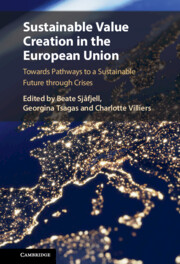 Sustainable Value Creation in the European Union
Sustainable Value Creation in the European Union Book contents
- Sustainable Value Creation in the European Union
- Sustainable Value Creation in the European Union
- Copyright page
- Dedication
- Epigraph
- Contents
- Figures
- Tables
- Contributors
- Foreword
- Preface
- Part I The Objectives of the EU’s Social Market Economy Revisited
- Part II The (UN)Sustainability of the EU Economic System
- Part III Ways Forward in the Promotion of Value Creation
- Part IV Thinking Ahead
- 12 Pathways to Sustainable Value Creation
- Index
12 - Pathways to Sustainable Value Creation
from Part IV - Thinking Ahead
Published online by Cambridge University Press: 01 December 2022
- Sustainable Value Creation in the European Union
- Sustainable Value Creation in the European Union
- Copyright page
- Dedication
- Epigraph
- Contents
- Figures
- Tables
- Contributors
- Foreword
- Preface
- Part I The Objectives of the EU’s Social Market Economy Revisited
- Part II The (UN)Sustainability of the EU Economic System
- Part III Ways Forward in the Promotion of Value Creation
- Part IV Thinking Ahead
- 12 Pathways to Sustainable Value Creation
- Index
Summary
The conclusion higlights continuing challenges for the EU and the rest of the world and how the future humanity faces is uncertain. Yet an optimistic message is also presented. Noting that shareholder primacy is increasingly coming under question and a growing interest in the concepts of corporate purpose and sustainable value creation, the conclusion draws upon the suggestions made among the chapters throughout the book to highlight the potential for corporations to be a force for good if supported by more effective legal and regulatory reforms and operating with more innovative structures and technologies. More stable, resilient and democratic institutional structures are necessary too as is the inclusion of active political and entrepreneurial women. Also fundamental to change is setting sustainable value creation within planetary boundaries as an overarching purpose for business, with mandatory rules to ensure that sustainability is integrated into the governance of business across global value chains. In a policy coherence for sustainability perspective, the book concludes by positioning the research-based reform proposals for business and finance within broader European Union laws and policies, underlining the necessity of reform also of other related areas, including circular economy policies, competition and state aid law and public procurement.
Keywords
- Type
- Chapter
- Information
- Sustainable Value Creation in the European UnionTowards Pathways to a Sustainable Future through Crises, pp. 301 - 314Publisher: Cambridge University PressPrint publication year: 2022
- 1
- Cited by
